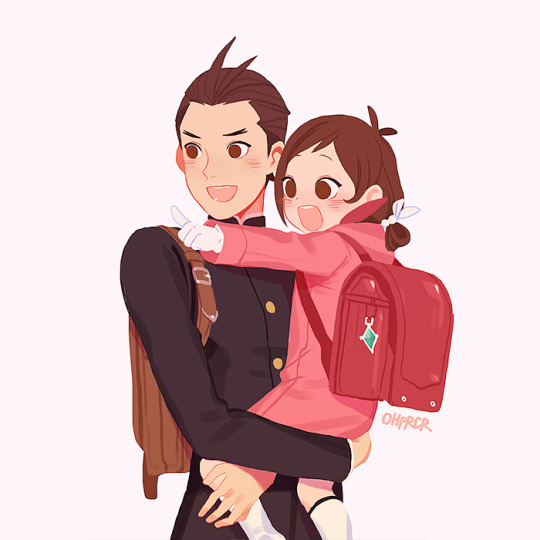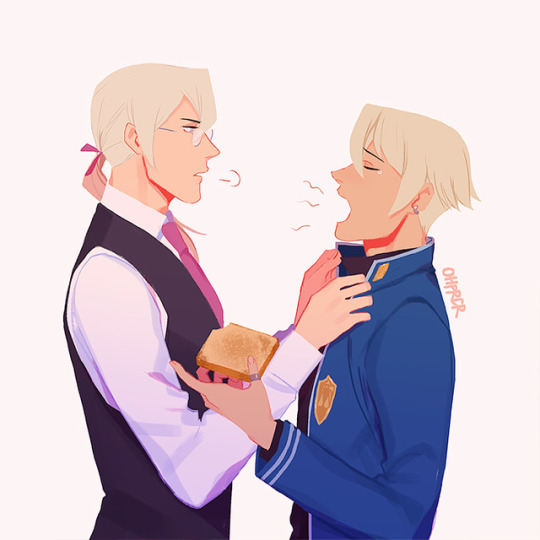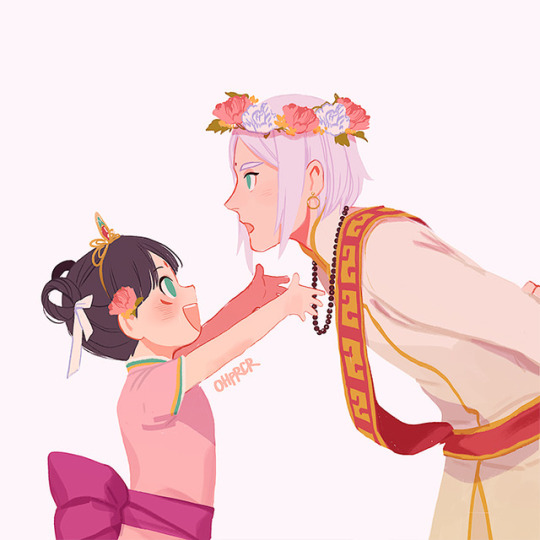Don't wanna be here? Send us removal request.
Text
Some Alien Stage thoughts!
Hello!
I recently discovered Alien Stage and I wanted to share some thoughts on this wonderful series!
And so I decided to log in my old Tumblr account to post because I fell into this black hole that is alnst haha
Sorry for the LENGTHY stream of deranged thoughts (you're now warned haha, I'll be glad if my nonsense made some sense to you), I tried to organize it, hope it makes some sense 8D
I might miss parts of Alien Stage's universe, so please do not hesitate to reach out!
Have a great day/evening 🌠
On Anakt(oria) Garden and love
I wonder if Anakt Garden, a kindergarten that prepares children for Alien Stage, is named after Anaktoria (or Anactoria), supposedly one of Sappho's students and lovers. In Fragment 16, the archaic Greek lyrist longs for the memory of her beauty now that she is gone.
To Sappho, love is the most beautiful thing in the world, surpassing the grand glory of war, the epic, praised by men.
As an allegory, Sappho retells the myth of Helen in order to celebrate love and centers the story on Helen's own character and choices (forsaking everything for her beloved Paris, without a thought for Menelas, her child and parents), thus escaping the homeric epic of the Trojan war and how love was traditionally viewed through a militaristic lens in ancient Greece.
And Sappho doesn't judge that surrender to love. Helen overcame everything that could have anchored her life, held her back.
You could compare it to some extent to Till's attachment to Anakt Garden and how he rejected the escape Ivan offered him (more on that below in an analysis of Cure and Black Sorrow!).
She then explores her recollection of Anaktoria, that she'd rather see than 'all the troops in Lydia in their chariots and glittering armor' (as translated by Jim Powell).
In some translations (eg. André Bonnard in Civilisations grecques), this fragment is titled as an epinikion for Anaktoria, a victory ode that most often takes the form of a choral lyric (Sappho's works were also written as song lyrics), celebrating an athletic victory or a victory in war.
In Sappho's fragment, love's beauty is elevated in loss, in remembrance, and when it escapes the power dynamics of the epic (or domination, victory and violence). And on the contrary, I think that Alien Stage's dystopian setting fosters and instrumentalizes the tragedy of human love to elevate the aliens' domination (over humans, between aliens but also between humans themselves as they're forced in a survival show where only one can emerge as the winner) and violent urges.
On one hand love is Alien Stage's fodder, yet at the same time on the other it is the very reason pet-humans try to survive as humans. For example, they try to escape this eternal narrative of domination in Ruler of My Heart: the beloved is the only thing that will forever remain beautiful to them and rule over their existence.
Alien Stage's themes revolve around hope, love (whatever form it takes) and grief, the last ruins left of humanity.
Mizi's love for Sua crystallizes that in My Clematis: the Earth now long gone at the hands of aliens, Mizi recreated her humanity through her love for Sua, her god, her universe, her hope for salvation.
Back to Sappho, another thing to note is the emphasis on how radiant she remembers Anaktoria: her 'lovely step', the 'bright gleam' or 'radiant splendour' of her face. The original text puts a strong emphasis on the recollection of that radiance (κἀμάρυχμα λάμπρον προςώπω):
"With ‘the glitter of her face’, Sappho gives us a snapshot as evanescent as it is arresting. What is recalled is not the precise contours of a specific face, but a visual impression the motility of which carries over into recollection. Her ‘lovely walk’ similarly blends immediacy and fleetingness. The phrase flickers with Anactoria’s physical allure, but the particular qualities that made her beauty distinctively hers, as well as the wider context in which it occurs elude us. As we try to imagine Anactoria and realise how little we have to go on, we replay Sappho’s longing for her past", for her radiance that Sappho personally recalls and that we can universally apply to the loved one."
And in Alien Stage, we witness love as the characters strive to survive and remember flashes of their lives.
The light and colors, especially when they animate or leave the characters' eyes, are a proof of their love and grief, be it in My Clematis, MIZISUA, Black Sorrow or Cure. There's a lot to say about that, so I'll save it below in an analysis of Cure!
Till's memories of a cheerful Mizi are bathed in pure white (even when he hallucinates her in Cure): his feelings and his devotion are symbolized by an edelweiss (lit. noble white in German).
The theme of a single ray of light found in a sea of darkness is repeatedly found in the songs eg. My Clematis, Black Sorrow, Ruler of My Heart. Sweet Dream also introduces the cast and Alien Stage's setting in that fashion ('Now I live in darkness / Bring me brightness'). These genuine sources of light also contrast with the garish, artificial ones the Alien Stage produces as we can see especially in Sweet Dream and Dangerous: it's a light that goes unnoticed by the alien crowd, reveling in the idol survival show.
Flowers extend that idea: a single clematis bloomed on the huge black wall and hope was born. But it withered in the abyss. As said above, Till's feelings for Mizi also shapes into an edelweiss: because of the shape its petals form, the edelweiss is sometimes likened to a star, nicknamed snow star, silver star or star of the Alps, and it's also a part of the Asteraceae flowers, aster meaning star in both Latin and Ancient Greek (it will be relevant later about Cure!). I also learned that "in Romania, it is known as floare de colț, which means 'cliffhanger's flower.'"
'Standing on the edge of the cliff' (as sung in Sweet Dream), the cast finds a short-lived solace in that company, captive to an everlasting alien abyss. Passage of time, which is also what makes humanity, and eternity are also an overarching theme of Alien Stage.
Sometimes the background reinforces that image:
in My Clematis: Mizi and Sua facing the alien crowd sunk in the dark (as the lyrics mentions hope blooming from the 'huge black wall') as a shiny hologram looking like a flower blooms around them. It shines on them throughout the whole song, as though it isolates and protects them from the rest of the world. The score broke that bubble and blood 'bloomed' over Mizi's cheek. She falls on her knees, her profile engulfed against the blinding light of the stage, the ground pitch black, and her haven gone.
in Unknown (Till the End...): vivid red light 'dyes' the whole scene and the characters when Till smashes his alien guitar (and/or kills his opponent), desperate for Mizi's attention (more on that in the songs' analysis).
in Black Sorrow: the stage in itself immersed in the dark except for Ivan and the shooting stars by the last chorus, reminiscent of Ivan's escape attempt with Till.
in Ruler of My Heart: Luka's silhouette overlaps Sua's against the moonlight. Mizi's natural source of light, Sua, perhaps symbolized by the giant moon perched above the stage, is obstructed by Luka as his shadow dances over Mizi.
in Cure: the thunder and the blinding spotlights as Ivan kisses Till. A final light also catches Ivan's silhouette lying on the floor (his white costume emphasizes the contrast with the rest of the dim scene) as Till watches dumbfounded.
In another Fragment (fr. 96), Sappho also compared one of her lovers, Atthis, to a goddess ('she held you like a manifest goddess and took joy most of all in your singing'). If I remember correctly, Mizi was attracted to Sua's singing voice too in their first meetings.
Fragment 31 also explores the object of love as a being equal to gods upon the longing gaze of Sappho/the speaker: she is watching the man who is blessed to sit near her beloved and closely listen to the sweet voice and delightful laugh that sway her. Even though the man is likened to a god, he is only mentioned once, almost as if she pays him no mind and doesn't envy his place, and the rest of the poem delves deeper in the devastating grip her beloved has on her body and existence, how it 'seizes' her (not to mention how love makes her lose her sight and hearing, just like in Ruler of My Heart!).
Also, on Ruler of My Heart's 'You even outburn the sun, my star', how not to mention fr. 104B: 'the most beautiful of all stars'/'You are, I think, an evening star, the fairest of all stars'. You also have fr. 34, in which Sappho celebrates and personnifies the radiant full moon, also beautifully translated by Anne Carson: 'stars around the beautiful moonlight hide back their luminous form whenever all full she shines on the earth silvery' Some commented how the moon in Sappho's eyes could also symbolize women and love from afar given how she celebrates departed lovers. ... Yeah


It finds an echo in Mizi's monologue in My Clematis: '[mankind] believed that the entire universe revolved around the Earth (just like the moon orbits the Earth). Thought that the place that connected with the sky, which they could not dare to reach was the place where the gods lived... My god, my universe'.
Moreover, flowers are given a significant place: they symbolize Aphrodite, the goddess of love, and the lovers wear them (fr. 2 and 94).
In Fragment 94, as her lover is mourning their imminent separation, Sappho asks her to remember the time spent together, the flower wreaths made of roses, violets and crocus she used to adorn her head with. The floral scent and oils also further the sensuality of the loved one.
EDIT: Finally, Sappho's works also focus a lot on the beauty of the loved one's eyes. It seems it's fr. 138, I wish I could find the exact reference (the best I could find as a title was 'Because you love' and 'Stand up and look at me, face to face'), but one of her poems begs the lover to stand up and 'look at her, face to face' (Cure?), to 'unloose the beauty/unveil the softness of/in [her] eyes', which is pretty reminiscent of the importance of eyes in Alien Stage. There's also an excerpt from a papyrus (which I can only find in French unfortunately), another 'To a loved one', that begs the dear lover to come, [with] the 'gaze' that [Sappho/the narrator] literally 'venerates' (more on eyes in an analysis of Cure and Black Sorrow below!).
A lot of similarities can be drawn here!
As to why I think Alien Stage/Anakt Garden 'instrumentalizes' human love: the Garden's official website states it earned the most wins on Alien Stage and prides itself on having the best music education system, offering "a variety of educational programs to help with emotional stability".
Anakt Garden thus promises to provide a "human-friendly educational environment" that makes the "most beautiful crying sounds" (much to think about here...).
I've yet to dig more into it but perhaps the 'collars' they wear in Anakt Garden actually measure that emotional stability they seek, kind of like the Dominator in Psycho-Pass haha? Could the colors gradually range from red, to orange then green depending on that stability?
What could set Anakt Garden apart from the other kindergartens? What makes their overwhelming success?
The Garden's logo looks like a metronome and a finger heart replaces its hand (see the pictures below!). Could the song's 'perfect' tempo be obtained by idolatry and mournful love?
It's a little detail, but Anakt Garden might have this idea in mind in its projects: its website seemed to have announced a 'Zeus unit', another reference to gods, with Hyuna's picture on it... ? I guess it was shut down because of her escape.

In addition, the Garden publically illustrates their success with a lot of pictures of Mizi and Sua together. The bond they shared might represent the successful model it wanted to obtain from pet-humans.
And I don't know to what extent the experiments we saw flashing in Cure are linked to this aspect of Anakt Garden but in MIZISUA, the moment Mizi and Sua locked eyes and showed interest in each other, which would become love in their days at the Garden, a mechanism was triggered: what looked like 'cells' above both capsules were being injected by some sort of needle before the two drifted apart.

I mentioned the lighting, but there's more to say about the artificiality of the world Anakt created: it's utopian and asepticized, its backgrounds look like they're coming right from a child's two-dimensional sketchbook, daubed with bright colors compared to the rest of the settings, drawn more complex, detailed, 'real' and that we see outside (eg. the ruins My Clematis shows, the comets Till and Ivan witness, or when Till fights the alien in Black Sorrow).

What's interesting is how finite that world is: in some shots, you can see the characters trapped in a cube, as though it projects a hologram of vivid, perfect backgrounds on its inner faces. Till might've exited Anakt through a glitch to bring the clematis wreath back. That delimited world is what actually traps the cast in an unsettling, everlasting abyss.

Also off-topic, but from the official art and Sweet Dream, Sua gives off the impression she's the only one privy to what lies 'behind the scenes' of Alien Stage, always looking back, not forward, or outside the frame, and how she also 'embraces' the cast, like the 'origin' of the pet humans, the prime 'clone', something like that.
That's maybe what Ivan's part refers to in Cure: "Sick of these nights to come / To be engulfed in silence". It can literally be translated like "Sick of* drawing/painting over these nights / Collapsing in the silence**".
*The verb 질리다 is used and can both mean be sick, tired of but also frightened, terrified (ie. dumbfounded or unnerved because one is surprised or scared), which can go in line with "To quiet my fears" (불안 means apprehension ie. fear that something may happen, disquiet, uneasiness, anxiety, insecurity).
**고요 means silence, quiet, stillness ie. a state of being quiet, peaceful, neither noisy nor chaotic
Ivan probably remembers the nights he saw outside (when he first saw the shooting stars, choked by the alien and when he escaped with Till), symbolizing freedom. He's afraid Anakt Garden and Alien Stage will paint over a dull utopia over the freedom he saw once.
On Till and Ivan in Cure
"Dissolve me in your gaze"
About the line "Dissolve me in your gaze", I think it's interesting to note:
'dissolve' comes actually from 녹이다 which means melt, thaw (ie. liquefy ice or snow by applying heat to it). By extension, it can also mean ease, soften ie. ease unpleasant feelings or thoughts and melt, captivate ie. cause to fall for or be addicted to something (could it be a wink to Unknown's overdose?).
even though Mizi is a snow star with 'icy lips', her gentleness melts Till's 'nothing'
a nice touch to this part is how only 눈 is used for Mizi's gaze (they could have used 눈빛 or even more specifically 눈동자, pupils, as Ivan's part did): 눈 can both be the eyes and snow, they're homonyms. (Also interesting how snow feeds into the idea of short-lived beauty!)

to wish to be melted by icy lips or snow itself could show, combined with 'Not a single drop of me remains', how badly Till wants to disappear within Mizi and also how doomed his love is meant to be.
"These falling stars"
I don't believe Till is oblivious to Ivan's feelings: Ivan's clear absence from his childhood memories (and especially Ivan's attempt to run away with him) doesn't mean he's unaware. I think it's quite the opposite actually: he actively decided to obscure those memories (and perhaps whatever else they might carry) because he wanted to remain in the safety of Anakt Garden and Mizi.
In Round 3 (around 2:29) you can definitely see Till waking up as the score is being calculated but also at Black Sorrow's last chorus: Ivan lets his perfect mask fall for a brief moment, his finger pointing in front of the camera to an unknown 'you', his black sorrow, stars falling in the background. I wonder if they're keeping Till's reaction unknown for Round 7?
It's worth to note that in Cure, the lyrics 'Until these falling stars / Are buried in the blur of time' are sung by Till alone (twice with the full version, and that part in the last chorus is particularly highlighted before he and Ivan sing the rest), not even once by Ivan. Since Black Sorrow strongly attached the image of falling stars to Ivan, one could naturally attribute this line to him. Yet it's not, and it's pretty interesting:
Initially, I took it as 'stars' meaning the whole cast (since they're idols, or stars), and their fall to eternity (often associated to the alien world in the songs, take My Clematis or Black Sorrow for example) could be alluding to the doomed fate that awaits pet-humans at the hands of the aliens: Till is aware of what awaits all of them and perhaps decided to accept it in exchange of the comfort of the 'world' Anakt Garden and Mizi bring him. He might be contemplating death as he only hung onto the comfort of Mizi's pure kindness, now lost to him. As a last cry for help, he wishes at least for his distress to be understood and his existence, his story not to be forgotten in the everlasting abyss he deems himself, and everybody else, condemned to. His part in the bridge stresses his despair: -(으)ㄴ 채 is used for "(With our story) / Lost in forever's embrace" and describes a state a subject is in while doing an action. While they dance to this everlasting melody, their story is buried in the eternity.
'Stars' could also refer to his feelings for Mizi (his edelweiss) in particular and everything she represents to Till: his safe world is destroyed now that she's gone missing, but in the meantime, until the end, be it that he lets go of his love or his suffering as a pet-human ends... He desperately wishes to hold on to her image to survive.
The lyrics specifically mention stars falling ('무너질 이 별들까지'): what's used here is 무너지다. It describes a descending motion, what is pulled, torn or crumbled down ie. for something piled up or standing high to be falling apart or scattered, and for a structure or one's body to lose power, and then fall down or collapse. Shooting/falling stars do exactly that. It also fig. means heart-broken, shattered ie. losing a stable state of mind after suffering a sad affair. Could it be Till's sole hint to the escape with Ivan?
A more literal word for meteor could have been used here (유성) but I think that ambiguity lets us interpret it as we like: a metaphor for the pet-humans and Mizi fated to doom and the meteor shower Till marveled at with Ivan. Also Alien Stage's universe suggests everything that made humanity is now gone, so who's to say significant parts of their knowledge has not disappeared too? Especially in a kindergarten supervised by aliens. Someone commented under Dangerous' MV that Till probably brandished his index in front of the crowd as if he reproduced the middle finger, barely passed down despite the Earth's extinction, I liked that idea!
The verb used for 'buried' is 묻히다:
be covered, hidden ie. for something to be covered with a different material after being placed somewhere
be buried, hidden, concealed ie. to not be known as something is deeply hidden
If those lyrics also refer to that moment (which is once more shown in the MV from Ivan's point of view), why would Till wait for it to be 'buried'? Does he want to erase it from his memory? Did it affect him to the point he'd need Mizi's love to overcome whatever it meant? Why?
I believe Till saw freedom there and was more overwhelmed than he let on in Unknown: he was 'overdosing' on Mizi's reassuring presence, she anchored his existence. He didn't want to let go of the world that accepted the 'empty' him, no matter the cost. I think the dynamics between the characters are intricately tied to how they were brought up by aliens: in Till's case, a pet-human never wanted unless on discount and most likely beaten up by aliens constantly, an embracing and cheerful figure like Mizi was bound to finally make him feel a deep sense of belonging.
I get the feeling what shook and turned his world upside down was indeed that escape, a possibility for freedom and there always was a correlation between that moment and falling even deeper in love with Mizi: In Unknown, the lyrics "I don't care if my world turns upside down / (I wanna know all about you)" create causality between the two clauses with ~(으)니— the clause it is attached to ('I don't care...') signals the reason the other happens ('I wanna know...'): Till wants to know all about Mizi because he doesn't care if his world turns upside down.
Even though the lyrics in Cure ('Until these falling stars... Read my soul') don't establish pure causality, they still create a certain connection, a context between Till's love for Mizi and said stars falling into oblivion. The similar constructions lead me to think it was always meant to be about the escape. Till's world is also 'turned upside down', just like Ivan did with the 'red light hourglass' in Black Sorrow (see by the end of the post for theories about Black Sorrow!)
He perhaps also understood the extent of Ivan's feelings for him then and tried to avoid it all this time.
To drown in you and Ivan's mask
There are interesting differences between Till and Ivan's part when they say 'Let me drown in you (Till) / I'll drown in you (Ivan)':
Till: 너로 물들여
Ivan: 네게 물들게
The particle ~으로 mainly indicates with what means an action is carried out (eg. method, tool, device, material, ...). ~에게 signals the recipient the subject is doing something to, towards, for.
The thing is the verb actually used here is 물들다 (or 물이 들다, lit. for water to enter). It can mean be dyed, colored, tinged ie. for a color to permeate or spread slowly, be imparted or stained by something. Colors (especially red, see the part below in "To the tips of your fingers — to the end of your feet") play a significant role in Alien Stage's universe: it represents both the artificiality of the world that imprisons the cast (see the part above about Anakt Garden) and each character's humanity through love and hope for freedom/salvation.
And the same verb wasused in Sweet Dream's lyrics with '(White dress dyed red / 붉게 물들어가는 하얀 드레스)'.
You could translate Till's line as him begging to be immersed in Mizi's pure gentleness or love to escape his own existence.
As for Ivan, you can imagine he decided to bear Anakt's colors 'for' Till (ie. return to the Garden even when he had the chance to escape it, but was rejected by Till), yet admits it's also a selfish desire, 'just' (그저) to quell his fears. It could coincide with this part of Ivan's 'Confession' that @WhataFruit translated as "Thank you for being the victim of my shallow emotions."
Ivan could actually say he'll be dyed (red) for Till. And he indeed was, both physically (shot, dying his snow white costume red with blood) and figuratively, he lets his perfect 'mask' crumble for him (throwing away his composure and status as one of the crowd's favorites, feigning to choke Till in front of the audience), and also for himself in his last moments (the kiss).
He's also scared 'these nights' (or himself, Till and/or the rest of the cast, since no subject is expressly mentioned in the chorus) will eventually 'collapse' in the silence, and it answers Till's chorus: whatever the subject is, it is falling like 'these stars'.
While Till's part uses 무너지다, 쓰러지다 is used in Ivan's and also defines something that was standing to fall over (and all its figurative meanings).
It's details but there's a subtle difference between the two adjectives: the nuance resides in how the collapse is sideways, the object lying flat (which is how Ivan ended up...) and keeps the object's structural integrity.
EDIT: With 무너지다, the object, usually more massive and artificial eg. buildings, dam, winds up destroyed to pieces. '부서진 my world' ('My world collapsing') in Ruler of My Heart describes a similar destruction: it can mean be shattered (ie. for something to break into small pieces) and break down (ie. for something that has a certain structure to be destroyed so much as to be useless), but also break (ie. for waves or light to dash against something, spread out, and then be scattered) and be broken, shattered (ie. for one's hope or expectation to be destroyed).
I think it emphasizes how Till and Ivan cope with the impending doom:
Along with Mizi going missing, Till has lost the world he was desperately attached to. If the falling stars refer to the pet-humans, it might reinforce how Till sees humans and himself fated to nothingness and how he's resigned himself to awaiting his fate that belongs to the aliens. If the falling stars symbolize his escape with Ivan and freedom, he wants to forget it all, even down to the very idea, possibility of it by overdosing on the idealized safety Anakt and Mizi he's grown in all his childhood. He's forsaking it because he thinks it will deprive him of his home he's chained to — after all, Mizi has gone missing in the outside, 'abandoning' him to excruciating pain (what the MV of Cure shows during his part in the beginning...), he perhaps associated the two.
If these nights truly are about freedom in Ivan's eyes, he might be terrified of the tragedy about to befall him and the pet-humans, yet, even in death, he still refuses to be amalgamated to this utopia: these nights, this desire for freedom, his own body will eventually collapse at the hands of aliens but it will stay in its own one piece, a proof that they existed as humans. Also note how he prays Till will completely break his mask into pieces (I explained it a bit more just below!) ie. how aliens molded him, which aligns with the demolition/annihilation Till wants (무너지다): if he can't be free outside with Till, he will at least die as a human, and perhaps his wish for freedom will one day outlive the aliens.
Countless stars might well crumble, yet the endless walls never do.
I also liked the metaphor of Ivan's mask breaking down because of and for Till and the lyrics might feed into that image:
날카롭다 is used for Till's 'cold' words. It describes something sharp, pointed ie. having tapering, pointed or sharp ends and fig. sharp, biting, cutting (ie. so strong as to cause unpleasantness eg. criticism)
생채기를 내다 adds to that image for 'carve scars' under Ivan's eyes: Till's words literally leave scratches on his face
these words almost act as a knife or a chisel that Ivan wishes breaks through his mask: though the lyric doesn't specify what Ivan is fine with being destroyed (a simple 'everything'/다 is left), the context from the previous lines suggest it describes the rest of his face
the verb 부수다 (used here for 'break apart') fuels the image: it means break, smash ie. hammer a solid object and break it into pieces and also break, put out of order, ruin.
I think it's also important to mention Till's 'words' were the very thing that shattered Ivan's mask. It actually answered Till's supplication unbeknownst to him: to be read on Mizi's icy lips. Ivan welcomed Till's chaotic self, it grounded him.
The second half of Ivan's chorus ("In your gaze where I'm seen / Consume me, yes, me") might be in line with that idea.
The verb 보다 can mean see, look at, notice (ie. perceive with eyes the existence or appearance of an object) but also by extension read, look at (eg. words, pictures and symbols in a book, newspaper, etc.). Ivan wants Till to consume him within his gaze, and not only dissolve him. And what's ironic is the moment "In your gaze where I'm seen" is sung, Till averts his eyes from him and the following shot only shows him from behind.
Again, Ivan's composed mask might be tied to his childhood, subdued and obedient by his retainer's side, perhaps because he understood he'd not be punished on the condition that he indulged them. Sua might have lived a similar past as a mere product/toy of value only in the aliens' transactions.
Did he learn that the hard way as he tried to rebel once? In Black Sorrow, only the first parts of his flashback show his actions not rewarded by the aliens: we see him crying, hung over a building by an alien (on the left you can see the rest of the children, so did the alien want to show them what would happen if they don't obey?), then his dishevelled bowlcut and shirt as he is probably being experimented on, a grim look on his face. He also wears the collar Till always has on to restrain him.
The rest of the flashbacks show Ivan impassive, with a perfectly neat bowlcut and shirt, showered with praise and presents by the aliens.

(It's a detail but in Black Sorrow at 1:13, the alien that makes a deal with another one as it pats Ivan's head is probably the one we see at 2:12; is it his 'producer'/master?)
Red "to the tips of your fingers — to the end of your feet"
I don't know if I read too much into this (as I perhaps do the entire post haha), but I also love how the MV of Cure is ironically consistent with its lyrics:
it begins with Till begging Mizi's ghost to make him disappear 'to the tips of her fingers, to the end of her feet'
the lyrics have a consistent theme of being dyed (물들다) by/for the loved one, associated to relief by pain in order to forget oneself in the beloved. Another occurrence of 물들다 being used in the series is in Black Sorrow, when Ivan predicted the outcome of Alien Stage's 'story' he wanted to escape once: "at the end of this story, there is only a cold spot stained with blood and empty air."
I believe Alien Stage established a consistent connection between love, freedom and its restriction (the starlit sky during the escape that tinted both Till and Ivan's eyes red and the red neons found on the collars, the robots and the Garden's structures, shackles, ...) and death as an act of sacrifice for the loved one through the color red, reminiscent of the clematis ever-present on Anakt Garden's artificial grass. Once a creeping plant (it's sometimes nicknamed the "queen of climbers"), it was meant to climb heights, 'huge black walls'. Yet those artificial flowers bloom within the limits of the Garden, unaware of their original nature. Clematis is also the symbol for Mizi and Sua's love, it adorned the wreath Sua gave to Mizi, Till treasured it and went after it for Mizi. Sua's blood 'bloomed' on Mizi — you can actually have an interesting wordplay in Korean between blood, 피, and a common verb for 'bloom/blossom', 피다, which can also mean 'it's blood'. (There's a lot to be said about red but I'll save it for later about Black Sorrow!)
And... Ivan's blood dyed Till to the tips of his fingers to the end of his feet:
I do think it's intentional Till's fingerless gloves were designed dark red, similar to the blood pooling by Till's feet: freeing Till from his collar was always a part of Ivan's character. His final act of sacrifice was feigning to strangle him: it led him to his death. And the MV emphasizes a lot how blood dyed/stained Till's hands all the same, realizing with horror what happened: the instant Ivan's hands let him go, he takes his dark red hands to his neck.
Another thing to note is that blood (피) can be a paronym of rain (비), which completes the overall image, Till drenched by the rain from head to toe: on his own accord, Ivan 'dyed', gave Till the salvation he sought after Mizi and didn't allow him to die, which he desperately wished for.
In the MV, it's also significant the last lyric (un)sung by Till was "(With our story) / Lost in forever's embrace": 묻히다 is once more used for 'lost', and it can also mean stain, smear ie. make a liquid, powder, etc., be stuck to another object or leave a trace: though the object is not specified, Till and Ivan's story ends up staining the 'eternity' with everything that red could carry. Is it buried and fated to oblivion, or did it manage to leave a trace?

About Ivan's prediction in Black Sorrow, the 'empty air' is also worth to mention. In Cure, he begs Till to 'consume' him: 마시다 means both drink and breathe in!
It's a side note, but on the topic of colors, I love how Mizi and Sua's eye color are complementary, yellow/orange and mauve!
In your pupils where I'm seen and Black Sorrow
I talked about the lines "In your gaze where I'm seen / Consume me, yes, me" above (in To drown in you and Ivan's mask).
What's peculiar about the first line is the specific use of 'pupil' (눈동자) for Till's 'gaze' and not simply 'eye' (눈), like Till did in his verse for example.
What could explain the difference?
In-universe (especially how Ivan pictures his 'world'), I think pupils create a special place for the one actually truly 'seen', unlike a simple look: a pupil is a hole in the center of the iris and allows light, 'colors' to strike the retina to 'see'.
Someone's gaze can be referred to as 눈빛 (lit. the light of one's eyes): it's the look in one's eyes ie. feelings revealed through the eyes or the glitter of one's eyes ie. the light or energy seen in them. It also ties in with Sappho's reminiscence of Anaktoria (provided Anakt Garden is actually a reference to her haha). I believe Alien Stage emphasizes a lot the eyes of the characters because they're a window to what they're feeling.
Ultimately I guess it amounts to embrace the other's true color, their humanity, as ugly as it is beautiful, anger, pain, selfishness, sadness, joy, everything it carries, to love and be loved in return and find solace in each other.
It's probably what Ivan saw in Mizi and Sua in 'Confession' as they intertwined hands, the comics stressed his bright red pupils upon the scene.

Red pupils are particularly highlighted in Ivan's character, be it in Black Sorrow or Cure. They dilated when Ivan saw Till's will to fight against the alien: in the form of Till, the shooting stars (freedom) he couldn't reach once again appeared before him.
Though Black Sorrow's lyrics and MV don't explicitly spell it out, combined to Mizi's soliloquy in My Clematis, you can picture the starlit sky and Till are actually Ivan's personal 'God':
"Once upon a time, mankind believed in God and had religion. They believe that things that cannot be solved by human strength are the will of God. (...) Thought that the place that connected with the sky, which they could not dare to reach was the place where the gods lived."
He can't reach them from the dark sea he's trapped in yet they shine bright.
Black Sorrow's lyrics create a particular picture for Ivan's story:
The world created by the aliens and captivity as a pet-human are associated to a pitch black sea, and Ivan’s eye can also visually represent that prison: the red pupil is confined within the black iris. The single light filling his eyes shine like a star on the edge of the iris, out of reach. You can imagine red as as the captive artificial red clematis designed by aliens to grow on grass instead of naturally climbing the ‘huge black wall’. You can also imagine it as a symbol of the collars (they don’t seem to open as long as they’re emotionally unstable eg. by rebelling, aliens have complete control over them thanks to this device it seems) and the omnipresent alien surveillance in the Garden (we first encounter red in the MV as a red-eyed alien hangs Ivan over the building).
It feels like quicksand he's sinking in: the darkness is 'soggy', 질척하다 describes something muddy, watery ie. mud, dough, etc., being wet and sticky because it contains a large amount of water.
There's actually a double image here: Ivan (and the rest of the cast) is stuck inside a sandglass (모래시계) that ceased functioning, condemning him to eternity, as the shining red sand can’t be turned over. I believe that's why the sea is described as closing in on him in a rounded motion. He realized he’s confined within the glass walls of a still sandglass, and I guess it can be Anakt Garden: it’s a finite cube the children don’t see the transparent limits thereof. It projects all kinds of images to give the children the impression of a real horizon. He perhaps found the glitch and tested it with Till he wanted to flee with: so he turns the hourglass from the inside. So that time finally resumes its course, creating hope for a ‘long time’ with Till. It’s the sole occurrence in the song where time is defined and finite, in comparison to before the escape (‘always’ in the same place with 늘, always ie. invariably, all the time ; waiting for you ‘endlessly’ with 하염없이*) and after Till rejected him (you are ‘always’ for me Black sorrow with 언제나, always, all the time, every time ie. invariably without changing with time). In this endless world, the 'only' thing ('너만') Ivan 'waited' for was Till, it was the only moment the time felt finite, or that Ivan hoped it would be. To link it to Ruler of My Heart, it's the only eternity Ivan seeks in its ephemerality, fleetingness: 'ruler of my heart — you are forever beautiful' (영원히 아름다워).
*하염없이 means endlessly, incessantly ie. in a state in which a certain act or emotion continues without stopping, but it can also mean absent-mindedly, blankly, vacantly ie. without any thoughts, being worried about something. I think it aligns pretty well with Cure's lyrics: Till was Ivan's cure to quell his fears. (I don’t really know if the escape happened right after Till fought the alien, some time could have passed in-between!)

The red ‘sand’ is turned upside down: shooting stars (meteoroids, ‘space rocks’ burn up and disintegrate into meteorites at the atmosphere’s contact) spangle a red sky and Ivan escapes with Till. Red breaks free of the black sea and expands without limits. Till’s eyes are wide open, his pupils are filled in wonder with the sky burnt red by the fluorescent green shooting stars, one could say in a similar way My Clematis described the galactic stardust spreading out in the eyes of the 'clematis'.
(Note that the color of the shooting stars looks pretty similar to the light flashing in Till’s eyes, determined to fight the alien. Shots of shooting stars kept being superposed to the moment he was standing up to fight, as though he symbolized the shooting stars to Ivan!)

And yet, Till lets go of Ivan’s hands and goes back to Anakt Garden*: the red light is gone from his eyes, they shrink as he guiltily averts his gaze from Ivan.
*Another thing to note about time in the lyrics: Till's refusal might've been symbolized with the lyrics "(Turn the red light hourglass...) / With you for a long time," ('긴 시간을 너와'). The original line was also left hanging: the particle ~ (과)/와 ('and' or 'with') and 'long time' (긴 시간을) miss a verb to complete the picture (eg. could it have been spend time, 시간을 보내다?), as though it was abruptly cut short by the chorus, forcing Ivan to realize black sorrow is what will await him, even if he turned the red light hourglass.
Before Ivan realizes Till’s rejection, two bright red lights were shining in his eyes: they were shining brighter than the now dull red pupils you could almost miss. They were nearing the end of his black pupils, as though symbolizing both of them swimming past the dark sea and almost reaching the surface.
He turns around to watch Till in surprise: the two bright red lights are now dimming and getting smaller. Or they’re taking in the hue of the fluorescent green shooting stars. Ivan’s red pupils reemerge, once more conscious they sink in the dark sea.
It dawns on Ivan his escape is impossible without and with Till: he will never reach him yet he can't survive without that light. The star will never burn the sky red again. Yet only its blinding green light now flares in Ivan’s completely extinguished eyes as he faces Till's silhouette going back to Anakt Garden: he can’t be free without Till, so he returns to the still sandglass. Till is the bright star shining from afar, unreachable and yet it's also Ivan's 'black sorrow'. Ivan realizes Till defines his world: escaping doesn't mean anything if it's not done with Till, even outside he'd still be captive to/long for Till.

I find it interesting Till is shown waking up in the present right before Ivan's last chorus, revealing the rejected escape: he appears completely closed off from the pitch black rest inside his fluorescent green capsule, as though it symbolizes how Ivan sees him (the sole star casting pitch black sorrow on him).
At the same time, it could foreshadow Till's rejection: he completely cut himself off from the burning red sky. Till's name could also refer to his teal eyes: with Alien Stage's meaning for colors in mind, Unknown (Till the End...) could have an interesting additional reading (see below!), teal to the end, never mingling with another color.
(It doesn't help that the lyrics playing during this specific shot are "At the end of this story, there is only a cold spot stained with blood and empty air" with a bloodstained Till, almost as a premonition of Cure!)
Back to Till's rejection, these shots are also interesting:

You can see Till's right hand, that was guided this far by Ivan's through the escape, clenching. But it also shows his left hand tightly gripping the arm that rejected the escape (you can see it from the creases crumpling on the right sleeve): yes, it shows Till's guilt, along with his averted shrinking eyes (and I don't know if it is intentional but his design will keep them small inside of the Garden and on stage), but it's also almost as though something inside of him (the security he depended on at the Garden?) forced his hand to let go and it was met with a strong resistance that was hard to silence (a budding desire to escape? And perhaps with Ivan?).
The second succession of shots could also symbolize Till's desire to escape, repressed deep down, as his right hand lingered on Ivan's hand for a few seconds, down to the tip of his pinky, before breaking the hold.
And I believe it has a lot to do with Till's theme of being supposedly left without 'better options' than to 'overdose' on his love for Mizi: actually, it's because he's not left with the cruel possibility (or freedom) to choose, and especially refuse ('거부 할 수 없어 overdose'), that he drowns in his love for her, symbolic of the depedency the alien world and Anakt Garden fostered in him. Overdose can lead to death and perhaps Till is aware, but wants to maintain the status quo, in denial that refusal could even exist. His escapism crystallizes in his love for Mizi and pure acceptance he can only go back to and ask for permission in Cure ('Allow me...'/'허락해줘' repeated twice).
Back to pupils, Till's also dilated one more time in Cure for only seconds, as Ivan faced him and brought his hand to his cheek before kissing him.

'Confession' also reveals his pupils were dyed with dark red as it happened. Could he have belatedly caught a glimpse of freedom in Ivan's love for this short instant?
The irony of this comic is how as Till sees red in him, Ivan thinks to himself "But better me than her / Since you won't really dwell on it if it's me."
If we can apply Ivan's "map of the eye" to Till, Till isolated himself from colors, red, within the confines of Anakt Garden (the black pupil) and Mizi, unreachable. He's sinking in fluorescent green/cyan, the light he's emitting alone. He finally 'sees', accepts red burning in his pupils before Ivan, just like meteoroids* should shoot the sky red as time resumes.
*What's interesting about this image is how it's potentially debris from the Earth, now in ruins, that burn against the alien planet's atmosphere, a last ephemeral proof of the freedom humans once had before:

I also can't help but think the title for Till's song, Unknown (Till The End...), is both an obvious reference to his love for Mizi she'll 'never know', but also to what has happened in Cure. For the 'end', it was perhaps the one announced by Black Sorrow ("At the end of this story, there is only a cold spot stained with blood and empty air"), concluded by the "Till Win" reflected in the blood puddle (is that win the end of what's unknown?).
EDIT: Also, Cure does mention ‘end’ in its lyrics: if the song is ‘endless’ (끝없는 이 노래), a proof of their perpetual suffering in this world, Till wanted to find an ‘end’ (끝) to the tips of Mizi’s fingers, feet, and lips (허락해줘 네 손 끝까지 / 네 발 끝까지 / 차가운 네 입술 끝에). Ivan was the one who eventually ‘enacted’ that end without Till realizing as a testament to his love for him. ‘Icy’ lips now take another meaning as Ivan kissed Till with lips that would soon grow cold.
But what could be 'unknown' until the end? And to whom?
EDIT: I wish I could find it back on Twitter, but I saw someone point out it might be a wordplay with Mizi as 미지 is indeed the unknown in Korean! And in the same line, Unknown (Till The End…) is pretty interesting because Till’s deepest feelings, in Korean (feeling empty, his world shaking, upside-down, his love for Mizi that he 'can't refuse'), are covered by a flurry of lyrics in English! The title itself, completely in English, also conveys the same facade and what’s fascinating is how Till, present in English (‘Till The End…’, a wordplay with the character’s name and until), cannot coexist with Mizi once the title is transcribed in Korean (it could be ‘미지 (끝까지…)’)!
Mizi will always stay Till’s better option and at the same time his love for her will remain unknown till the end.
What’s unknown might also be about Till himself, since the existence of the 'unknown' might be tied to 'Till'/until.
And if we look at the lyrics only Till sings in Cure, it is omnipresent both in time ('until these falling stars...') and space ('to the tips of your fingers... to the end of your feet') with the particle ~까지.
묻히다 (in "Until these falling stars / Are buried in the blur of time") is also used for 'buried' (as said above, it can also mean stain, smear), and what's buried can be seen as unknown as it is deeply hidden.
And as Till watches Ivan fall to the ground, his pupils look like they explode, almost like how shooting stars would disintegrate... One of Ivan's shot wounds also bled like a shooting star:

So what happens once these falling stars are eventually buried under the eternity? Did Till realize his inner turmoil only after Ivan died? Did he realize a star disintegrated before his eyes?
Both suspended time and space Till was praying for cruelly crystallize before him by the end of the song: he's dyed in Ivan's 'colors' from the tips of his fingers to the end of his feet and his pupils take in the 'light/color' of a star collapsing.
An interesting detail in this scene is how Till's pupil is pitch black as it sparks like a star: the stage ends with Till sunk in complete dark, lights gone. Did Ivan also become his black sorrow?

I think it's interesting to note that in the full version of Cure, Till also sings the lines "In your pupils where I'm seen / Consume me" in the end, as though he had the song's time to maybe reciprocate Ivan's wish. That time was cut short and Till was forced to 'read' Ivan's soul in his death. It's not about being melted, dissolved in Mizi's mere eyes, glance anymore like in the beginning, it's morphed into a wish to be consumed/drunk in pupils that truly see, read him, out of everyone else.
In the full version it's also Ivan who gets to sing the very last words: "(Consume me), yes, me", as though he finally reached Till and opened his eyes on his feelings.
And be it in official art or in the MVs, Till's character is designed after an 'error', a chromatic aberration of red and cyan.


Yet red never 'completed' him in his eyes until the escape and Cure.
There was also this pretty recent art of Till with red and cyan stars:

A side note on the also red and cyan soap bubbles you can see here!
As they mix together, layers of soap (비누) molecules encase water (물) between them and trap air (so 'nothing' in a way, it's hollow as there's no liquid inside) in a spheric shape. In this drawing, you can see a red film (soap) trapping blue (water) and air inside.
Soap bubbles can be called '거품', which can also mean something looking great on the inside, while there is nothing inside. It can remind you of Till's characterization in Unknown (Till the End...) with 'Nothing was my everything / The melody that filled the empty me', the idealized 'escape' he can't refuse in Anakt Garden, his happy 'bubble' that washes dirt away (the harsh reality of pet humans).
You can also call soap bubbles '(비눗)방울'. 방울 was also used in Till's part in Cure ('Hurt me so that / Not a single drop of me remains'): 방울 describes a drop ie. a small mass of liquid formed in a round shape... like blood (피) can be! And this picture also shows bubbles 'filled' with red, like blood drops, as though soap dropped blood when they burst.
What's also bright red in the art is some sort of toy foam blaster from which the soap bubbles come from. But guns and red are heavily associated to the aliens and what awaits the loser of a round... ! You can see what looks like a gun barrel and detonations in the background, in purple. The 'shooting' (ha... !) stars also look like detonations. The hand that creates, perpetuates fragile bubbles/pet-humans is also the very one that 'bursts them' so easily.
It might be a reach but 방울 could be an ironic wordplay: a combination of 방/빵 (the 'bang!' onomatopoeia for a gun firing) and 울 (either the stem of 울다 as in to cry/shed tears AND also cry/howl/sing/make a sound, reminiscent of the 'most beautiful crying sounds' aliens crave for, or an abbreviation of the pronoun 우리, 'we'). They are fated to sing, die, and mourn the lost blood drops as the gunshots set the cadence to this everlasting melody.
The water trapped in can also be a reference to the 'dye' sung in Cure with 물들다: from outside (trapped by 'soap'), water or color literally comes, fills what was inside (an 'empty' Till) only upon its destruction, only once blood is shed and empty air (with the bubble gone) is left, like it was announced in Black Sorrow.
(It might just be me but the way these bubbles are drawn also makes them look like eyes and their pupil!)
I also find it pretty interesting the scribbles behind Till are purple (a gun barrel; the two detonations — Ivan was shot twice in Cure; and what seems to be the shot of Till as he watched Ivan collapse), as though red and blue were 'dyeing', reaching one another.
A pretty cool detail in Cure is how the rain is also affected by chromatic aberration:

Yes, it's a common finishing touch in digital art but it thematically adds to the picture: rain dyes both Till and Ivan in the same colors in this last song.
In optics, chromatic aberration is a defect in a lens or mirror that causes the formation of either a distorted image or one with coloured fringes. White light is deviated, distorted and decomposed into separate rays of colors.
In a broader sense, it can mean deviation from what is normal, expected, or usual; departure from truth, morality, etc. Out of all the cast, Till is the only character who was seen beaten by aliens constantly and forced to wear a collar shining red, since he was probably emotionally unstable and kept to run amok. The rest of the cast is seen obedient in comparison, even though they perhaps want to escape or fight back.
There's also the few flashes we catch at the beginning of Cure, all painted in red and cyan, that suggest Till was a part of an experiment, so is it linked somehow?
And back to pupils a little bit, I wrote under Round 6 a pretty wild reach on the experiments haha:
'The first few seconds show experiments on Till and other children: at first I thought he was part of whatever project the children fell victim to but his picture doesn't seem to be included while the brown haired kid we see being experimented on (with the eye injection) has their picture crossed out. It could mean the experiment was a failure, and maybe that was the case for almost everyone on the wall. What I do notice is that the picture on the bottom left, though blurry, looks like Ivan... ? You can also see for a split second a pixellated meiosis/mitosis (or whatever haha, my biology class are since long forgotten) happening, meaning somehow the experiment ended up being a success with at least one of the children? The eye injection seems to be made with whatever they drained out of Till (and we can also see someone else by his side)! It's most likely blood given the color but who knows, it might be special somehow... ? Alien Stage seems to emphasize a lot eyes, from their liveliness/emptiness to their colors (like they did in the first round with Mizi and Sua and here with Ivan and Till) and I can't help but think how vivid blue Till's eyes are and how it's similar to the other color associated to the experiments, the color of his eyes is not only highlighted throughout the whole song but also at the very beginning after those flashes to the past once the screen fades to black. Only the shade of his eyes remain. I don't know where I'm going with this but given how he didn't appear on the wall's pictures, could Till have been some sort of successful 'matrix' to whatever experiment these children were subjected to? And since one of the main points of this experiment seems to be the eye injection with the red liquid and Ivan's pupils are dark red, could Ivan have been the (sole?) successful receptacle of it? It might make sense they decided to show in this specific round events Till probably did not witness (the eye injections, what the children pictured on the wall went through ; he seems like he's an important part of the research however) but perhaps Ivan, someone else involved in the round, was actually a living proof of. And what are these experiments for? Are they linked to what happens on stage or is it something else? Could this event hold a key to the overarching plot? I also can't help but notice Ivan is the only one shown ''''''''''''befriending''''''''''''/communicating with an alien and knowing how to remove the collars (and potentially escape): could all this be linked? EDIT: someone on Twitter (GreenT, you can look up their thread if you search ‘alnst theory’!) made an interesting connection between a flashback of Ivan tasting Till’s blood and the experiments. They theorized he might’ve become something like a vampire after they experimented on him and also mentioned his telltale crooked tooth as a potential sign of it. I think it would absolutely make sense that he survived the round if the experiments gave him 'superhuman' features eg. regeneration, immortality! Adding to that theory, I'm wondering if those abilities were the result the aliens were looking for in the children that would later become idols: driven by a never-ending entertainment, it would make sense for the aliens to search for a way to keep their 'dolls/products' alive as long as possible. But in that case why would they kill the loser of each round in the first place? In addition to a meta-critic of the idol industry and 'survival' shows taken in their literal sense, I can only think of it in-universe as a way to satiate their passions through violence inflicted on humans, and perhaps they realized behind the stage they were quickly running out of entertainment 'material' to keep the show going? But I know so little of alst's universe so I might be completely off the mark haha'
Mizi's madness before Luka and the stage that took Sua from her is also painted in red and chromatic aberration. Hyuna will help her escape.


White (a symbol of Till's idealized Mizi and Anakt Garden, where the structures, children's clothes, collars, are white) was distorted with Till, who doesn't obey like the rest, something like that? Till's love for Mizi blooms into a white edelweiss and it anchors him to the asepticized Garden. But Anakt's project is destined to fail: Mizi, one of their model pet-humans, didn't obediently grieve like they expected her to to produce the most beautiful crying sound. She exited the stage.
Yet white and black also represent humans' hope and despair. It's also interesting that in the present, Ivan is the one that stands before Till entirely clad in white, almost as though it is superposed to Mizi's past image.
EDIT: My Clematis also had Mizi and Sua dressed in black and white clothes respectively, and just like Ivan, Sua died. The ones in black grieve their loss. Ruler of My Heart is the only song where both Mizi and Luka are dressed in white.


And finally you can also see Luka solving a red and blue Rubik's cube at the end of Round 3, did he perhaps figure Till out, and predict he'd face him next?

#alien stage#alnst#alnst meta#에이스테#vivinos#qmeng#anakt garden#alnst mizi#alnst sua#alnst ivan#alnst till#mizisua#ivantill#alnst cure#alnst round 6#the edits never end haha
24 notes
·
View notes
Text
I’m almost certain that little Izuku came up with ‘Dynamight’. Like, imagine them playing pretend as Dynamight and Mighty Boy, the hero wonder duo!
This story withholds info for a reason, and everyone but Deku knowing the name means it’s significant to him.

“Your alias represents your desires… your ideal self”, “you’re the last one I’m telling…”
Seriously. His closeness with Deku is ‘the embodiment of how he wishes to be’, and he literally only wants Deku to know once he thinks he’s worthy of it!?
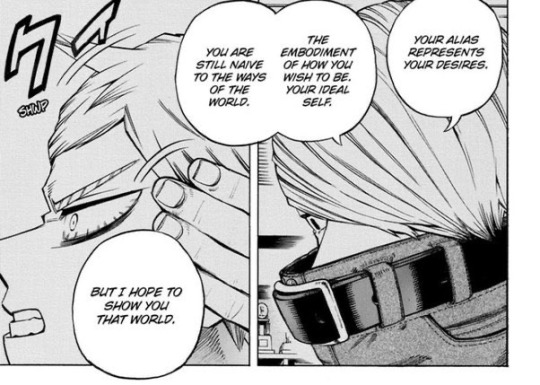
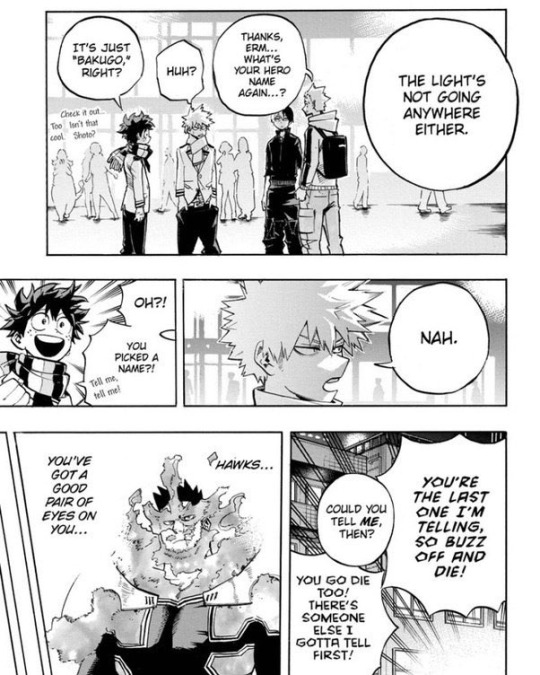
What if this was the real reason they fell out. They’d always wanted to be heroes together, and Deku being quirkless destroyed that. Kacchan distanced himself and convinced himself that he didn’t care, he was better off alone.
He couldn’t use that name while they were apart but mending his relationship with Deku allowed him to want to be that hero again. Deku’s Dynamight. ����😭😭
664 notes
·
View notes
Text
Just to be clear, the whole "Deku and Bakugo holding hands by the end of the manga" thing isn't like. Something weird or made up, or even indicative of shipping. It's literally just the culmination of their interactions considering the way Horikoshi centralized "reaching to/for" as being foundational to Bakugo and Midoriya's relationship. Almost all of their big moments can be described as the act of one reaching for the other, both physically and emotionally—and both matter.
The whole reacher/reachee dynamic starts (chronologically for them) at about four, and this one interaction defines the entirety of their relationship going forward.
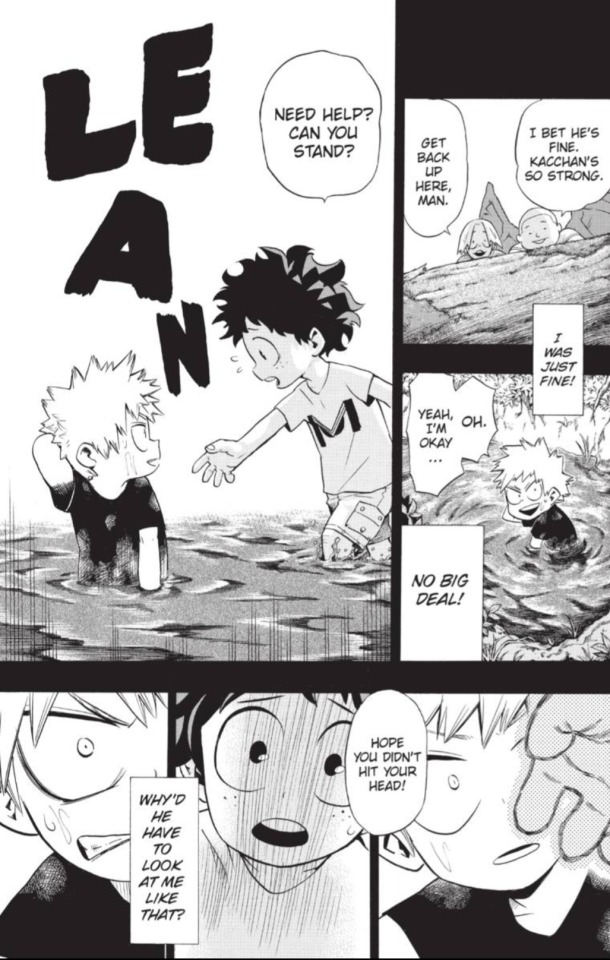
Notice how Midoriya reaches, and Bakugo shoves him off. He clearly recognizes the gesture, but he absolutely refuses to respond in kind. This is the break in their relationship, the symbolic moment where Bakugo pulls away and Midoriya is left trailing behind after him.
It isn't until years later that Midoriya reaches out to Bakugo again, under similar, but much more dangerous circumstances. One thing hasn't changed; Midoriya is the one originally doing the reaching. What does change is that Bakugo, unlike when they were kids, reaches back:

I think a lot of people pass over Bakugo's response here as unimportant because you have to translate it through seven asshole filters to realize he's roundaboutly trying to thank Midoriya for saving his life, but it's relevant in that it sets the tone going forward. This moment shows that Bakugo is willing to reach back—not necessarily kindly, and certainly not physically, not yet—if Midoriya reaches first. It's the first sign that Bakugo does actually want a reciprocal relationship, even if he can't verbalize or actualize it yet.
We see this extended after Deku vs. Kacchan 1. Midoriya reaches out to Bakugo, chasing him down to do so. While he doesn't reach out physically so much, he emotionally reaches out by (vaguely) offering Bakugo information about OfA.
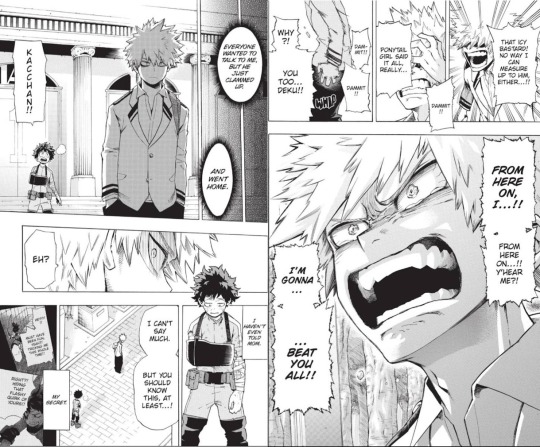
While Bakugo isn't nice about it, once Midoriya has shown his vulnerability, Bakugo responds in kind, emotionally reaching back to Midoriya. He doesn't leave Midoriya hanging, instead going the extra mile and, unprompted, exposing his own vulnerabilties. This is more movement towards a reciprocal relationship—if Midoriya opens up, Bakugo will follow suit, even if he still won't go first.
It takes their final exam for Bakugo to physically reach back. After Midoriya "reaches" (read: punches, but look at the posing, and how his arm is outstretched) Bakugo does the same. They manage it because it's hidden under the guise of training and teamwork, more violent than anything.
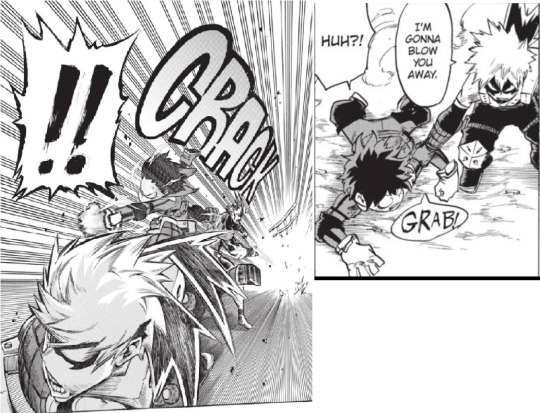
This sequence isn't just physical, though; Midoriya reaches out to Bakugo and reaches through his defenses emotionally in a way that actually affects him. Here, for the first time, Bakugo feels like he's being acknowledged. Seen. Midoriya's right, Bakugo doesn't just give up and neither does Midoriya, and if they understand that about each other, maybe they can manage to understand more. To be more than just estranged ex-childhood friends and rivals. So Bakugo reaches for Midoriya and shows him that he can and will reciprocate, so long as they're doing it on his terms.
It's after this, after Bakugo has realized he maybe can reach back when Midoriya holds out his hand and it won't be terrible, that they're thwarted by the plot. For the first time, Midoriya is prevented from reaching out, physically, and instead does so verbally, and Bakugo, who is also unable to physically reach out, verbally reaches back. Call and response. A pantomime of what they want, and intentionally unsatisfying.
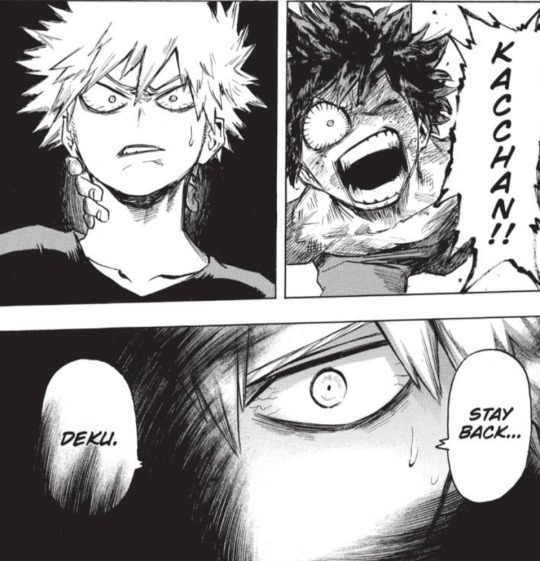
This is contrasted boldly and meaningfully against Kirishima physically being able to reach for Bakugo, who takes his hand without thought.
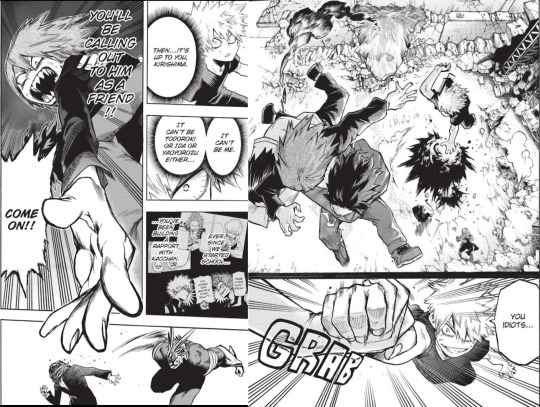
You'll notice this is mostly a physical act, not an emotional one. Sure, they're both happy to see each other and both their emotions are running high, but this moment isn't meant to be vulnerable and charged the same way Bakugo and Midoriya's reaching out is, because Kirishima and Bakugo have an uncomplicated relationship, while Midoriya and Bakugo do not. This moment is supposed to show Bakugo's individual, personal growth (in that he can even have a reciprocal, uncomplicated relationship built on respect and kindness with another person), but Kirishima's reaching out to him is largely utilitarian and being used within a larger contextual frame. It cannot exist alone because of how motifs function within works as a whole. This moment exists to bring attention to the act of reaching out mutually, and why it matters so much that Bakugo and Midoriya have yet to achieve it.
Having established that they both are actively thinking about this aspect of their relationship, it's only after Bakugo and Midoriya's near miss that things change again. Not entirely—while Bakugo instigates Deku vs. Kacchan 2, he doesn't really reach first. He's still too defensive, still too distrusting of Midoriya's intentions. He instead goes in on the offense, exposing Midoriya by bringing up OfA and forcing Midoriya's hand.
It's only when Midoriya reaches out, both physically and emotionally, that Bakugo breaks and reaches back.
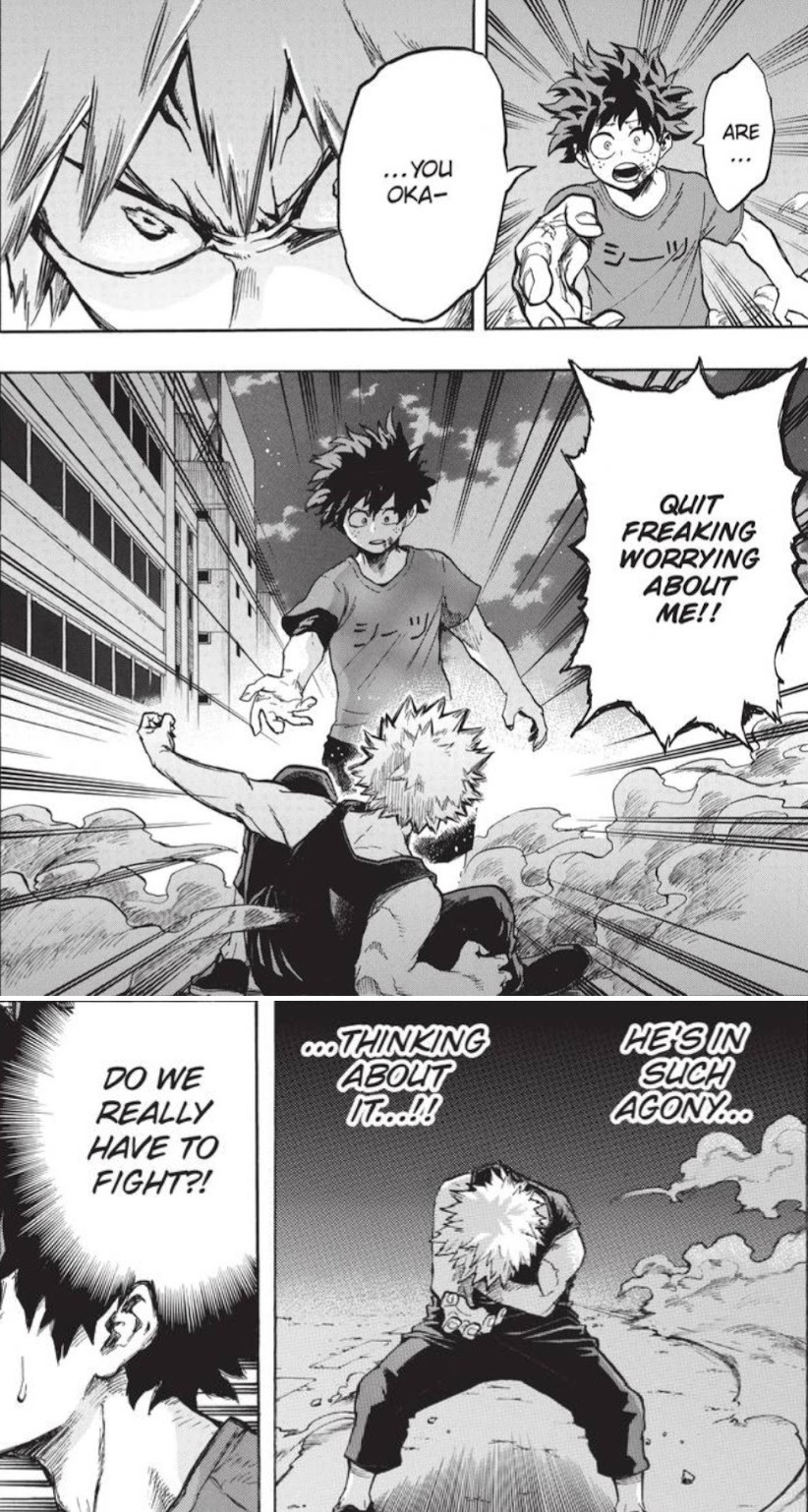
Look at the posing and the positioning of the characters within these panels. Bakugo isn't drawn like this for shits and giggles, he's intentionally shown to be holding his hand out to Midoriya. Their whole fight has been characterized by Bakugo asking Midoriya for things (information about his quirk, the fight itself, why did All Might choose him as successor), and this is one more time. He is asking Midoriya to keep reaching out—to let Bakugo reach back, despite his ongoing rejections. To be there with and for Bakugo as he works through his own issues and to not let go. To let him be weak until he can work up the strength to fully reach back, and even reach first.
Which he wants to do. Desperately.
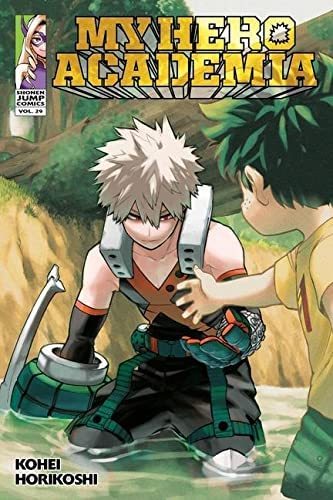
And when he does...
Bakugo reaches out first in his apology. Emotionally, not physically. Possibly because Bakugo actually tends to be pretty prickly about physical touch, and seems to treat that as more intimate than many of his peers, but I think his choice to reach out emotionally more has to do with Bakugo making the decision to do the difficult thing, to give Midoriya what he deserves. Because reaching out physically is just moving your hand—baring your soul? That shit hurts. That's hard. But it's what Midoriya needs, and it's what Bakugo wants to give.
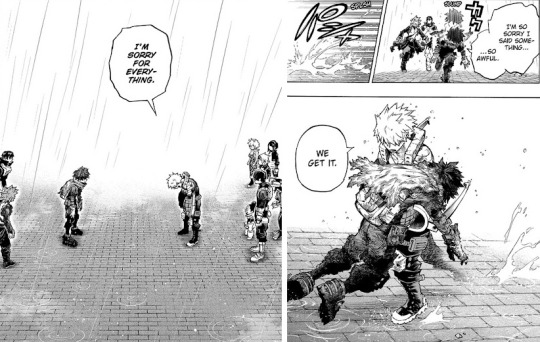
And now it's Midoriya's turn to reach back. Not emotionally, but physically, stumbling his way to Bakugo. There is no emotional reciprocation on Midoriya's part this time—Bakugo will need to reach out again, later.
It isn't until the very end that Bakugo reaches—physically—first. And for the first time, Midoriya's not there.
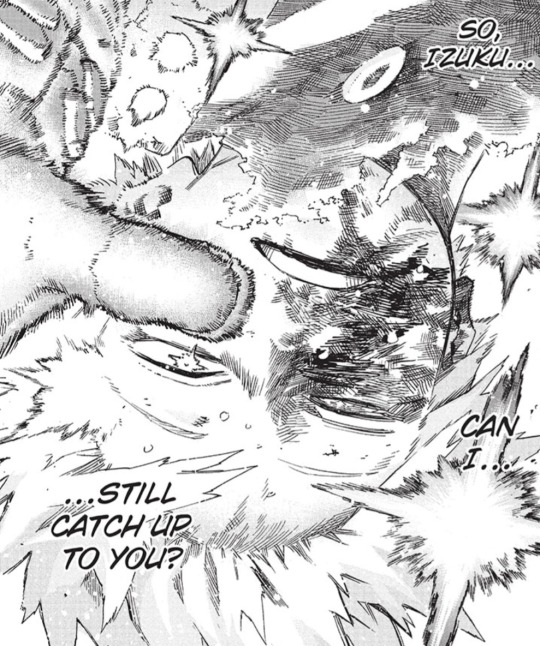
The whole point of their relationship, the moment this all suggests they are heading to, is the two of them reaching for each other and being able to connect. Physically and emotionally. That is the entire purpose of this constant back and forth, one reaching out in the hopes that the other will reach back. So far they haven't completely managed, but for the arc of their relationship to be complete, that has to happen.
I understand why this often gets put under a romantic lens, and while it can be, I guess, the motif itself and the arc of their relationship exists regardless of any reader's personal preferances. That's what writing conventions are for, so we can recognize and predict the outcome of the story as intended by the author. The act of reaching out isn't exclusive to Bakugo and Midoriya within the story by any means, but their relationship being defined by the act and symbolized by it, continuously depicted with it as the main focus, is certainly not an accident. It is the culmination, and the ultimate end goal of their relationship, which—again, if writing conventions are followed—should be met. Like I understand that people get told "there's no correct answers in media analysis" but baby, sometimes there are answers with enough supporting evidence that suggesting they're wrong is... I don't even know.
723 notes
·
View notes
Note
This may be something completely wrong but i was wondering why none of kou's wishes involved nene, and why kou says mitsuba doesn't think highly of him?
That’s a good question because I feel like one of Kou’s wishes would have been Nene saying her lifespan has been saved or something like that?


But maybe the House didn’t show Nene because it’s holding her captive?


And Kou thinks this about Mitsuba because—

Of this scene ^^^ where Mitsuba doesn’t believe Kou can ever understand how he feels?
57 notes
·
View notes
Note
(It’s not supposed to be hate on kounene, it’s just my opinion on ships and the spin off ;;;) Personally, I really liked spin off chapter (mostly because it made me laugh a lot xD) But I interpreted Kou’s feelings for Nene in this spin off differently. To me, this spin off shown that Kou’s feelings for Nene are pretty weak and not so deep. “Cute” and “loving how she screams” aren’t strong reasons for love, I just felt like Aidairo wanted to show us how weak those reasons are, not how he has a crush on Nene or anything. In my opinion mitsukou has much more potential and sense than kounene, and if Aidairo still wants to make Kou an energetic boy who’s crushing on Nene it would be weird to me. Couples in jshk are written like they have unconditional love, Hanako loves Nene so much he wants her to live, and he even created a whole fake world just for her. And he’s willing to die if it meant she’ll be happy and live her life. Akane loves Aoi too. And he loves her for her true self, not her fake persona she puts on herself. He just loves her the way she is, even with her flaws, and he would do anything for her, he would even become No. 1 and die for her if it meant her safety. Again, theme of unconditional love. And I think mitsukou have similar theme, too. Kou wishes he could save Mitsuba, prevent Mitsuba’s death. He said Mitsuba’s flaws too, but he said he likes him anyway, he acknowledged his good side and bad side and still liked him for the way he is (which is pretty similar thing to hananene and aoikane. It happened to both of these ships too). He was even willing to die for Mitsuba if it meant he could understand him and stay with him. This just feels like something much more than friendship and something that fits much more to unconditional love than those reasons why he loves Nene. It would be a pity if this potential for mitsukou got wasted :( I’m sorry if this ended up messy gjahsjdob
Omg yes! To everything you said!!! I love how you worded it—

Because it is true that Kou’s reasons for liking Nene *are* rather weak—no real depth to them besides thinking “she’s a cute girl and her screams are cute uwu” (omg that felt wrong to write lolol)
But yes! It’s like all the pairings have this “I’ll sacrifice my happiness for you/unconditional love”


-Hanako leaving Nene in a fake world to go back to the real one alone, so that she can live a happy and full life ;;


-Kou saying he will die so that he could be with Mitsuba forever.


And ofc, Nene wanting her old lifespan back so she can meet Hanako again ;; and how she accepts and loves Hanako for who he is—despite the crimes of his pasts ;;
And yess, it truly does feel like there is something more than friendship between Kou and Mitsuba after everything that’s happened ;;
It really is all types of love ;o;
159 notes
·
View notes
Text
Mitsuba’s power
I wonder how much knows Mitsuba about the past of the school.
He received the powers of No. 3 and he used them.
He can see all past school events reflected by a mirror.
In PP arc, he told us that he had watched everything of his former self.

I wonder if he was interested to the past of Tsukasa and Hanako.
He mentioned Tsukasa is scary, maybe he doesn’t want to see much of him.

He is also afraid of Hanako and his knife.

But theoretically Mitsuba could see what he wants.
I wonder if Hanako is afraid of Mitsuba? He feared the former No. 3.

He was also afraid that Tsuchigomori could tell something about his past.
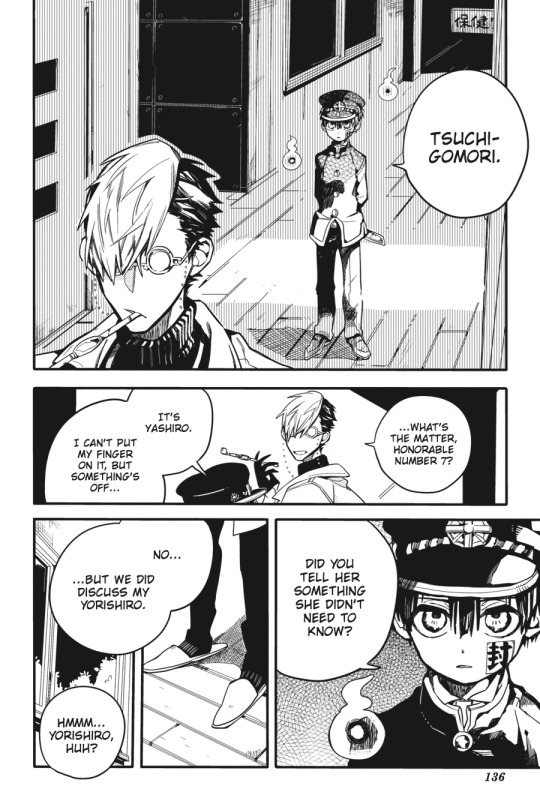
Is that a reason why he has such a distant relationship towards Mitsuba?

But Mitsuba likes Kou and Nene.

I think he was curious to see the past of them.
He probably knows Kou’s feelings for her.

And I’m sure he also saw much of the romantic moments between Hanako and Nene.

He knows they are in love and he told Kou about it even though he didn’t want to hear it.

In any case, the power of No. 3 can be very mighty. Mitsuba has the knowledge of the past and in his boundary there is a mirror with the power to look into people’s hearts.
Maybe his power will be very important in the next chapters.
154 notes
·
View notes












